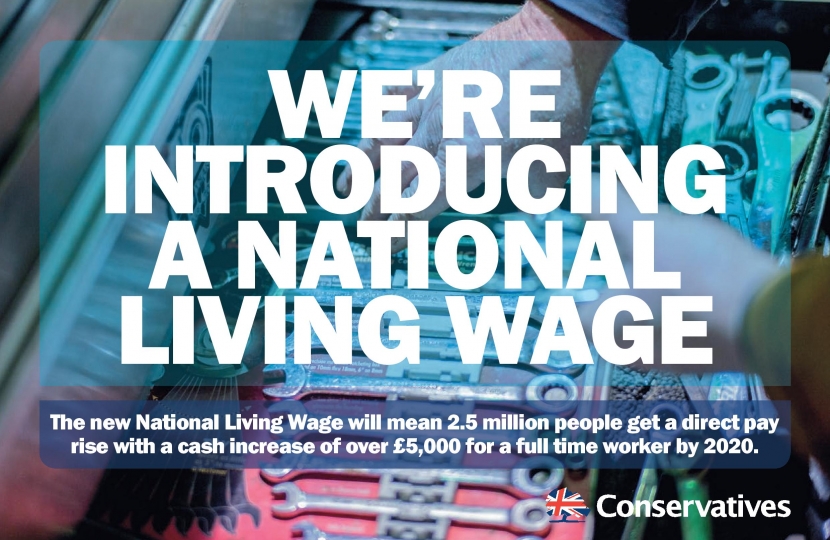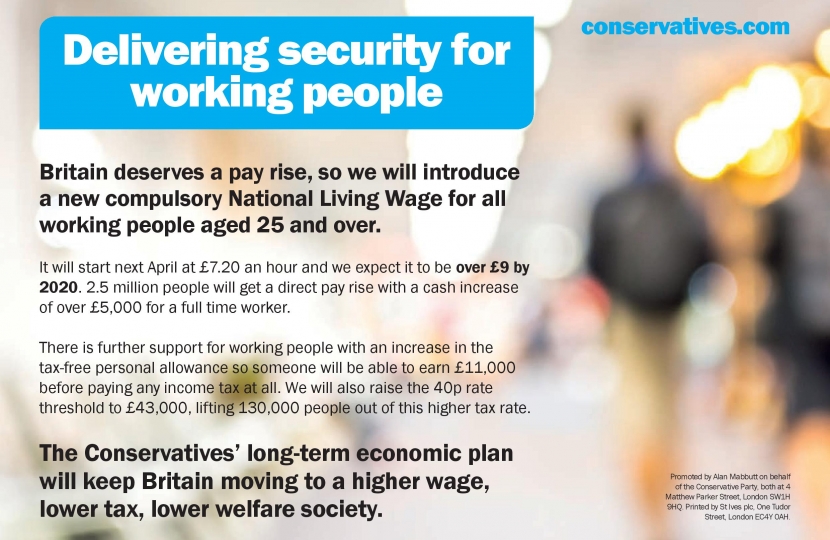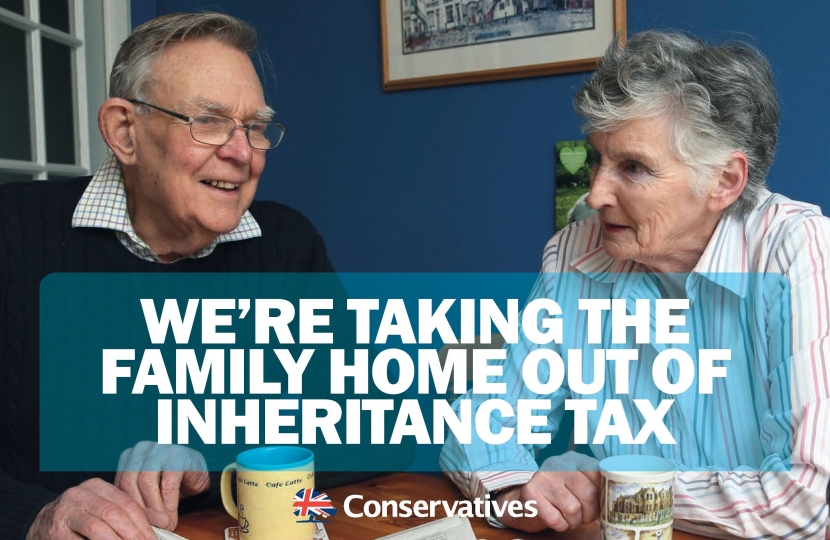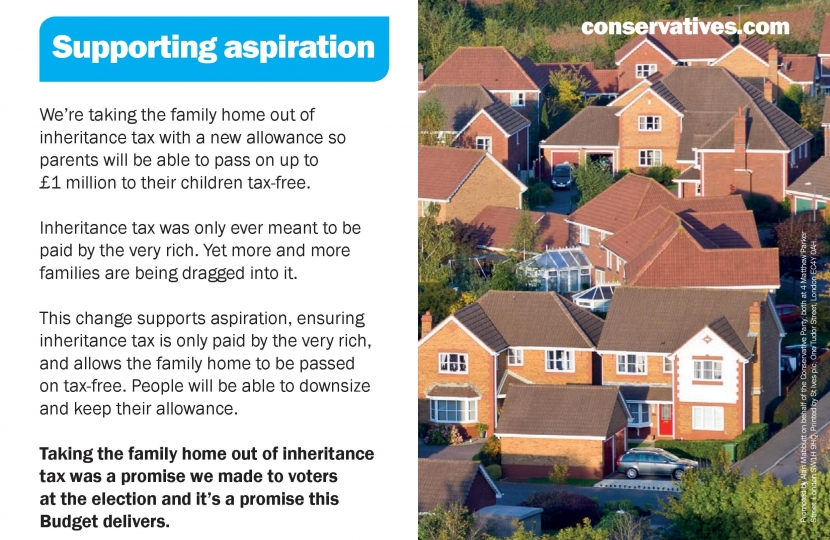On 8 July 2015, Chancellor of the Exchequer George Osborne delivered the Summer Budget. This is the first budget from a Conservative Government with an overall majority in Parliament since 1996.
Thanks to the hard work and sacrifice of the British people over the last 5 years, working through our economic plan, we’ve been able to turn the economy round. We won’t put that at risk.
This budget puts security first: the economic security of a country that lives within its means, the financial security of lower taxes and a new National Living Wage, and the national security of a country that defends itself and its values.
It is a One Nation Budget from a One Nation Government: continuing to move Britain from a low wage, high tax, high welfare economy to a higher wage, lower tax and lower welfare society.
Our Long-Term Economic Plan is working:
- Britain is growing faster than any other major advanced economy. The economy grew by 3% last year, faster than any other major advanced economy. Britain is forecast to be the strongest growing major advanced economy for a second consecutive year.
- Jobs are being created and living standards are rising strongly. Our businesses have created 2 million more jobs since 2010, and the OBR forecast that in current conditions almost a million more will be created in the next 5 years. Our ambition is to go further, working towards a target for full employment. Living standards are forecast to be higher this year than in 2010, and to continue growing.
- The deficit and debt as a share of the economy are coming down. The deficit has been cut by more than a half since 2010 and is forecast to fall further each year, reaching a surplus in 2019/20. Public debt is forecast to have peaked in 2014/15 and is set to fall each year of the forecast.
This budget sets out the next steps in our plan:
Eliminating the deficit and bringing the national debt down
We will cut the deficit at the same rate as we did in the last Parliament, and introduce a Charter for Budget Responsibility so we fix the roof while the sun is shining. The new Charter commits us to keep debt falling as a share of GDP each and every year as we move to surplus, and to achieving a surplus in 2019/20. Then governments will be required to maintain that surplus as long as we have real GDP growth of more than 1% a year.
Moving to a higher wage, lower tax, lower welfare society
Introducing a National Living Wage. Britain deserves a pay rise so we will introduce a new compulsory National Living Wage for all working people aged 25 and over. It will start next April at £7.20 an hour and we expect it to reach £9 by 2020 – giving 2.5 million people a direct pay rise.
Cutting taxes for working people so they keep more of what they earn. The personal allowance will rise from £10,600 to £11,000 from April next year and the threshold at which the 40p rate is paid will rise from £42,385 to £43,000. This is the first major step towards our commitment to raise the personal allowance to £12,500, and the 40p threshold to £50,000 by the end of the Parliament.
Making £12 billion of further savings in the welfare budget. Britain’s present welfare bill is unsustainable and we have set out £12 billion of savings to get it down. We’re doing this according to principles of: supporting the elderly, vulnerable, and disabled; expecting those who can work will to look for it and take it when offered; and ensuring working-age benefits are on a more sustainable footing.
Backing businesses to create more jobs
Cutting the jobs tax for firms. From 2016 the Employment Allowance will rise by 50% so a firm will be able to employ 4 people full time on the new National Living Wage and pay no national insurance.
Cutting Corporation Tax to 18% and raising the Annual Investment Allowance. We will reduce the Corporation Tax rate to 19% in 2017 then 18% in 2020. We are also reforming the archaic dividend taxation system, replacing the Tax Credit with a new tax-free allowance of £5,000 of dividend income for all taxpayers.
Permanently raising the Annual Investment Allowance. We are raising the permanent level of the Annual Investment Allowance from the £25,000 it is set to fall to at the end of this year to £200,000, giving a major, permanent boost to the incentives for long-term investment by small and medium sized firms in Britain
Delivering a plan for productivity and rebalancing the economy. The Budget takes further steps to rebalance the economy, devolving power across the UK and helping build the Northern Powerhouse. We’ll also set out a comprehensive Plan for Productivity, securing investment in transport, skills and housing. As part of this, an apprenticeship levy on large firms will help fund 3 million apprenticeships in this Parliament. We are also removing the artificial cap on university, and so this is affordable we will tackle the cost of student maintenance grants, replacing them with loans for new students from 2016/17.
Ensuring the national security of a country that defends itself and its values
Committing to meet the NATO pledge to spend 2% of our national income on defence. This will be for every year of this decade. We will ensure that this commitment is properly measured, because we know that while these commitments don’t come cheap, the alternatives are far more costly.
Making taxes fairer
Supporting saving and aspiration by taking the family home out of inheritance tax. We are raising the effective threshold for most couples to £1 million, so family homes are no longer hit by the tax.
Making sure the best off pay their fair share of taxes. We have set out measures to raise £5 billion a year from tackling tax avoidance and aggressive tax evasion. Alongside this we are abolishing permanent non-dom status, and tightening the rules to British people pay British taxes in Britain.






